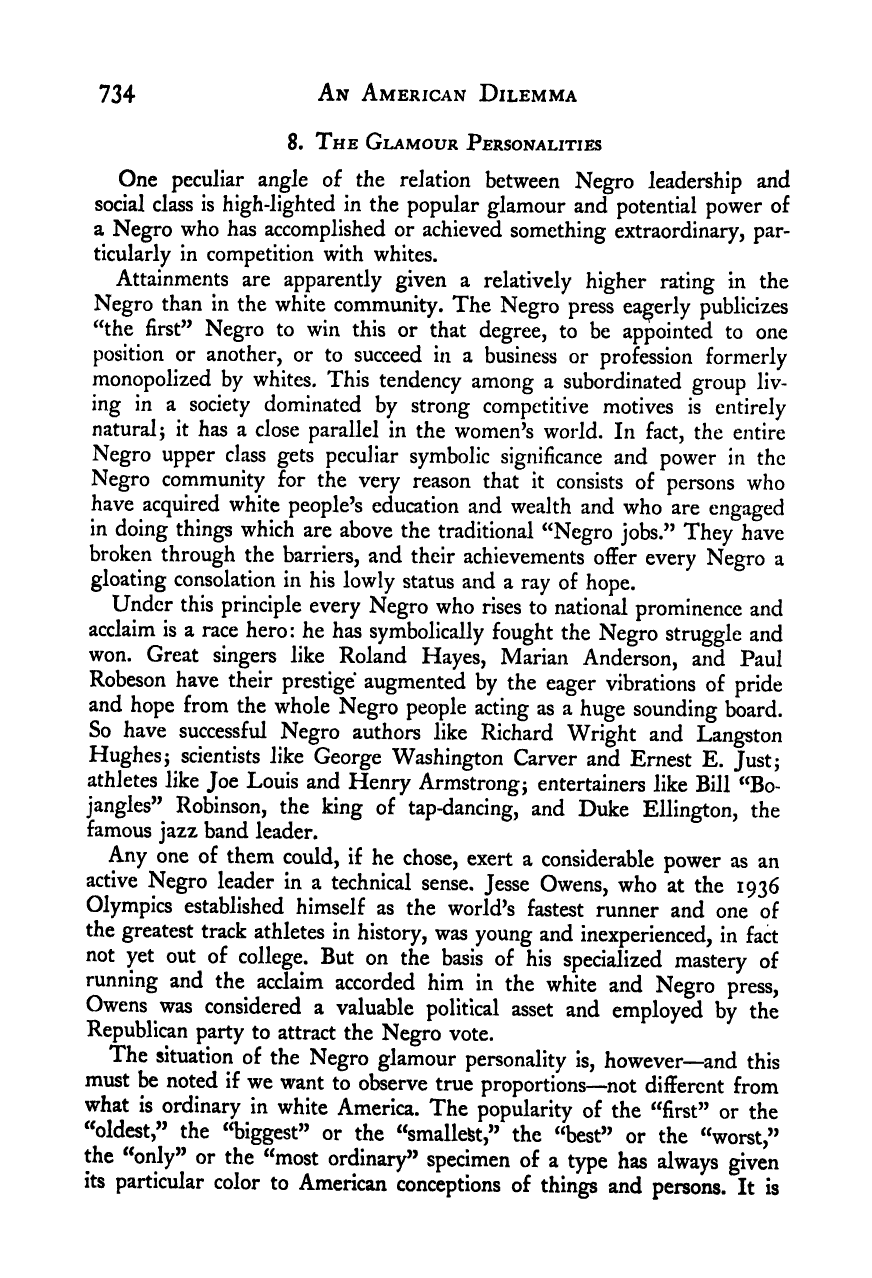Note: Gunnar Myrdal died in 1987, less than 70 years ago. Therefore, this work is protected by copyright, restricting your legal rights to reproduce it. However, you are welcome to view it on screen, as you do now. Read more about copyright.
Full resolution (TIFF) - On this page / på denna sida - IX. Leadership and Concerted Action - 34. Accommodating Leadership - 8. The Glamour Personalities

<< prev. page << föreg. sida << >> nästa sida >> next page >>
Below is the raw OCR text
from the above scanned image.
Do you see an error? Proofread the page now!
Här nedan syns maskintolkade texten från faksimilbilden ovan.
Ser du något fel? Korrekturläs sidan nu!
This page has never been proofread. / Denna sida har aldrig korrekturlästs.
734 An American Dilemma
8. The Glamour Personalities
One peculiar angle of the relation between Negro leadership and
social class is high-lighted in the popular glamour and potential power of
a Negro who has accomplished or achieved something extraordinary, par-
ticularly in competition with whites.
Attainments are apparently given a relatively higher rating in the
Negro than in the white community. The Negro press eagerly publicizes
“the first” Negro to win this or that degree, to be appointed to one
position or another, or to succeed in a business or profession formerly
monopolized by whites. This tendency among a subordinated group liv-
ing in a society dominated by strong competitive motives is entirely
natural; it has a close parallel in the women’s world. In fact, the entire
Negro upper class gets peculiar symbolic significance and power in the
Negro community for the very reason that it consists of persons who
have acquired white people’s education and wealth and who are engaged
in doing things which are above the traditional “Negro jobs.” They have
broken through the barriers, and their achievements offer every Negro a
gloating consolation in his lowly status and a ray of hope.
Under this principle every Negro who rises to national prominence and
acclaim is a race hero: he has symbolically fought the Negro struggle and
won. Great singers like Roland Hayes, Marian Anderson, and Paul
Robeson have their prestige augmented by the eager vibrations of pride
and hope from the whole Negro people acting as a huge sounding board.
So have successful Negro authors like Richard Wright and Langston
Hughes; scientists like George Washington Carver and Ernest E. Just;
athletes like Joe Louis and Henry Armstrong; entertainers like Bill “Bo-
jangles” Robinson, the king of tap-dancing, and Duke Ellington, the
famous jazz band leader.
Any one of them could, if he chose, exert a considerable power as an
active Negro leader in a technical sense. Jesse Owens, who at the 1936
Olympics established himself as the world’s fastest runner and one of
the greatest track athletes in history, was young and inexperienced, in fact
not yet out of college. But on the basis of his specialized mastery of
running and the acclaim accorded him in the white and Negro press,
Owens was considered a valuable political asset and employed by the
Republican party to attract the Negro vote.
The situation of the Negro glamour personality is, however—and this
must noted if we want to observe true proportions—not different from
what is ordinary in white America. The popularity of the “first” or the
“oldest,” the “biggest” or the “smallest,” the “best” or the “worst,”
the “only” or the “most ordinary” specimen of a type has always given
its particular color to American conceptions of things and persons. It is
<< prev. page << föreg. sida << >> nästa sida >> next page >>